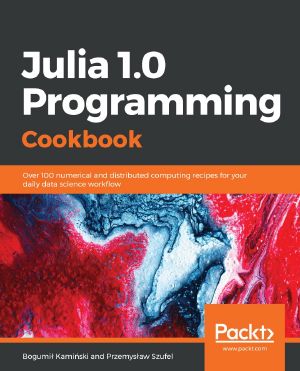Julia 1.0 Programming Cookbook

- Authors
- Kaminski, Bogumil & Szufel, Przemyslaw
- Publisher
- Packt Publishing
- Tags
- com051010 - computers , programming languages , general , computers , general , com018000 - computers , data processing , programming languages , tools , com051440 - computers , software development and engineering , tools , data processing , software development & engineering , programming
- Date
- 2018-11-30T00:00:00+00:00
- Size
- 4.25 MB
- Lang
- en
Julia 1.0 Programming Cookbook is a complete resource which provides you with time-saving methods to solve computational problems efficiently. This book will help you to overcome complex barriers to parallelize and scale code which has a slow execution time.
Discover the new features and widely used packages in Julia to solve complex computational problems in your statistical applications. Key Features Address the core problems of programming in Julia with the most popular packages for common tasks Tackle issues while working with Databases and Parallel data processing with Julia Explore advanced features such as metaprogramming, functional programming, and user defined types Book Description Julia, with its dynamic nature and high-performance, provides comparatively minimal time for the development of computational models with easy-to-maintain computational code. This book will be your solution-based guide as it will take you through different programming aspects with Julia. Starting with the new features of Julia 1.0, each recipe addresses a specific problem, providing a solution and explaining how it works. You will work with the powerful Julia tools and data structures along with the most popular Julia packages. You will learn to create vectors, handle variables, and work with functions. You will be introduced to various recipes for numerical computing, distributed computing, and achieving high performance. You will see how to optimize data science programs with parallel computing and memory allocation. We will look into more advanced concepts such as metaprogramming and functional programming. Finally, you will learn how to tackle issues while working with databases and data processing, and will learn about on data science problems, data modeling, data analysis, data manipulation, parallel processing, and cloud computing with Julia. By the end of the book, you will have acquired the skills to work more effectively with your data What you will learn Boost your code's performance using Julia's unique features Organize data in to fundamental types of collections: arrays and dictionaries Organize data science processes within Julia and solve related problems Scale Julia computations with cloud computing Write data to IO streams with Julia and handle web transfer Define your own immutable and mutable types Speed up the development process using metaprogramming Who this book is for This book is for developers who would like to enhance their Julia programming skills and would like to get some quick solutions to their common programming problems. Basic Julia programming knowledge is assumed.
Discover the new features and widely used packages in Julia to solve complex computational problems in your statistical applications. Key Features Address the core problems of programming in Julia with the most popular packages for common tasks Tackle issues while working with Databases and Parallel data processing with Julia Explore advanced features such as metaprogramming, functional programming, and user defined types Book Description Julia, with its dynamic nature and high-performance, provides comparatively minimal time for the development of computational models with easy-to-maintain computational code. This book will be your solution-based guide as it will take you through different programming aspects with Julia. Starting with the new features of Julia 1.0, each recipe addresses a specific problem, providing a solution and explaining how it works. You will work with the powerful Julia tools and data structures along with the most popular Julia packages. You will learn to create vectors, handle variables, and work with functions. You will be introduced to various recipes for numerical computing, distributed computing, and achieving high performance. You will see how to optimize data science programs with parallel computing and memory allocation. We will look into more advanced concepts such as metaprogramming and functional programming. Finally, you will learn how to tackle issues while working with databases and data processing, and will learn about on data science problems, data modeling, data analysis, data manipulation, parallel processing, and cloud computing with Julia. By the end of the book, you will have acquired the skills to work more effectively with your data What you will learn Boost your code's performance using Julia's unique features Organize data in to fundamental types of collections: arrays and dictionaries Organize data science processes within Julia and solve related problems Scale Julia computations with cloud computing Write data to IO streams with Julia and handle web transfer Define your own immutable and mutable types Speed up the development process using metaprogramming Who this book is for This book is for developers who would like to enhance their Julia programming skills and would like to get some quick solutions to their common programming problems. Basic Julia programming knowledge is assumed.